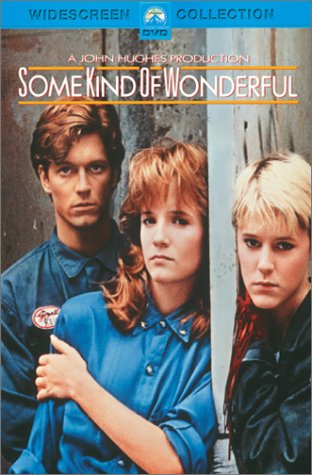
 John Hughes was the muse of the 80s high schooler. His writing credits include such giants of the genre as Sixteen Candles, The Breakfast Club, Weird Science, Pretty in Pink, and Ferris Bueller’s Day Off. In 1987, he finished his run of high school smash hits with Some Kind of Wonderful, the story of a guy (Eric Stoltz) who falls in love with a girl (Lea Thompson) who is completely out of his league. He recruits his best friend (Mary Stuart Masterson) to help him win Thompson’s heart, never knowing the obvious truth: Masterson is desperately in love with him.
John Hughes was the muse of the 80s high schooler. His writing credits include such giants of the genre as Sixteen Candles, The Breakfast Club, Weird Science, Pretty in Pink, and Ferris Bueller’s Day Off. In 1987, he finished his run of high school smash hits with Some Kind of Wonderful, the story of a guy (Eric Stoltz) who falls in love with a girl (Lea Thompson) who is completely out of his league. He recruits his best friend (Mary Stuart Masterson) to help him win Thompson’s heart, never knowing the obvious truth: Masterson is desperately in love with him.
In true rom-com form, Thompson proves not the vision of perfection she seemed to be from afar, and Stoltz realizes that the girl he really wanted, Masterson, was right there all along. This is not a unique trope, but it might be the clearest distillation of the Christian life, both misguided and proper, that we could ever hope to find.
Christians begin their life (we’ll say after conversion, for the sake of the comparison) desperately seeking to know more about God. We sing songs like “In the Secret,” which include the lines:
I want to see your face
I want to know you more
I am reaching for the highest goal
That I might receive the prize
Pressing onward
Pushing every hindrance aside
Out of my way
‘Cause I want to know you more
At first blush, there is nothing wrong with this goal. Preeminent Mocking-theologian Gerhard Forde would, however, have referred to this as a “tightly woven theology of glory” (On Being a Theologian of the Cross, 6). Luther himself said that the quest to know God was folly, and that the only reason we seek to know God was to domesticate and control him. It is Jesus who we draft into service as our guide to “become more like God” or to “get to know Him more.” I think Hughes agrees, but I don’t think Hughes thinks it works. John Hughes is with Martin Luther and Gerhard Forde!
 Eric Stoltz thinks that he can turn himself into someone that Leah Thompson will love. This is the Christian quest to “know God.” To know him, to become like him, so that he will love us more. We call this quest innocuous things like “deepening our relationship” and the goal seems laudable. But it doesn’t work. Lea Thompson is inscrutable. Hard to understand. Counter-intuitive. Like God, she can’t be “gotten to.” It just doesn’t work.
Eric Stoltz thinks that he can turn himself into someone that Leah Thompson will love. This is the Christian quest to “know God.” To know him, to become like him, so that he will love us more. We call this quest innocuous things like “deepening our relationship” and the goal seems laudable. But it doesn’t work. Lea Thompson is inscrutable. Hard to understand. Counter-intuitive. Like God, she can’t be “gotten to.” It just doesn’t work.It is Mary Stuart Masterson, in the Christ role, who is there for us. Stoltz sees her as a means to an end…and yet, she is the end. She is the love of his life. We too often see Christ as a means to get us closer to God, but it is Christ who is there to pick us up when our quest for God ends as it must: in bitter defeat and failure.
John Hughes puts in our common language what Luther and Forde, and before them John the Evangelist (John 1:17-18), said in theological language: We cannot know God. To try is to waste our time, at best, and to struggle for independence from him, at worst. God, though, has made himself known, in God the Son, Jesus Christ. The one we try to use as a means to an end is, in fact, the end in himself. He is the Savior.

Sign up for the Mockingbird Newsletter
COMMENTS
2 responses to “Mockingbird at the Movies: Some Kind of Wonderful”
Leave a Reply













I don't know what it means for the Doctrine of the Trinity, but MSM is way hotter than LT. Just sayin'.
I've never been particularly fond of the song "In the Secret." Thanks for putting words to why the song bothers me so much. Jesus died in my place, I'm forgiven, and my place is secure in him. What more do I need to know? What more does he need to tell me?